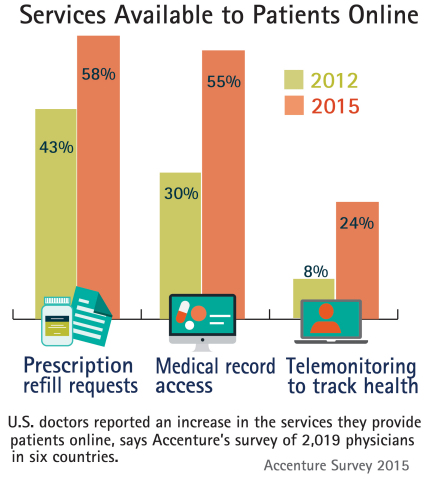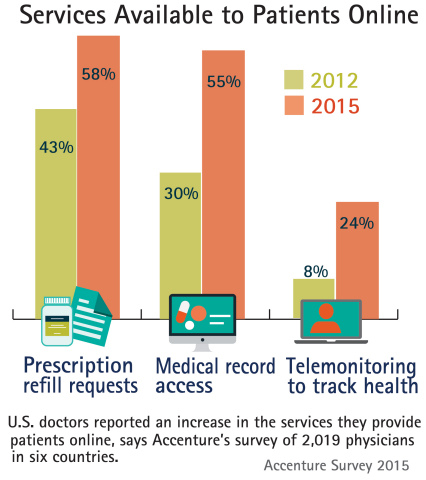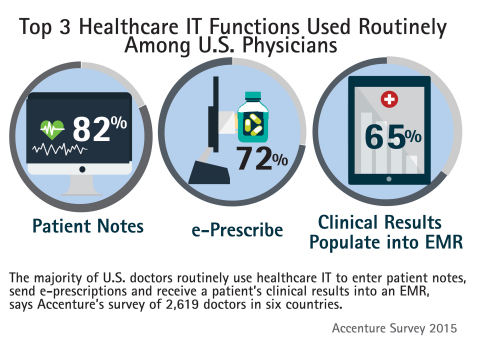CHICAGO--(BUSINESS WIRE)--A new survey by Accenture (NYSE:ACN) found that most U.S. doctors are more proficient using electronic medical records (EMR) than they were two years ago, but fewer believe that EMR has improved treatment decisions, reduced medical errors or improved health outcomes.
The U.S. findings, part of a six-country survey of more than 2,600 physicians, including roughly 600 in the United States, found that healthcare IT use among doctors has averaged double-digit growth, since Accenture conducted a similar survey in 2012. However, despite doctors increasing their use of technology over that time, fewer physicians believe that EMR has improved treatment decisions (46 percent in 2015 vs. 62 percent in 2012), reduced medical errors (64 vs. 72 percent) and improved health outcomes for patients (46 vs. 58 percent).
“Despite the rapid uptake of electronic medical records, the industry is facing the reality that digital records alone are not sufficient to driving better, more-efficient care in the long-term," said Kaveh Safavi, M.D., J.D., who leads Accenture’s global health business. “The findings underscore the importance of adopting both technology and new care processes, as some leading health systems have already done, while ensuring that existing shortcomings in patient care are not further magnified by digitalization. The U.S. healthcare market has made remarkable progress in EMR adoption, and we believe that as the technology evolves, so too will the benefits to physicians and patient care.”
Increase Physician Adoption of Healthcare IT
The survey found that the vast majority – 79 percent – of U.S. doctors are more proficient using EMR than they were two years ago. The number of U.S. doctors who routinely use digital tools, such as secure e-mail, for communicating with patients has more than doubled since the last survey, to 30 percent, versus just 13 percent in 2012. The five IT capabilities that U.S. doctors use the most are: Entering patient notes electronically (82 percent); prescribing drugs electronically (72 percent); receiving clinical results directly into a patient’s EMR (65 percent); using electronic administration tools (63 percent); and sending e-order requests to laboratories (62 percent).
However, despite U.S. doctors’ increased use of technology, more than two-thirds (70 percent) of them believe that healthcare IT has decreased the amount of time they spend with patients. About three-fourths (76 percent) of those surveyed believe that interoperability of the tools currently available limits their ability to improve the quality of patient care through healthcare IT. Although nearly all U.S. doctors (90 percent) said that better functionality and easy-to-use data-entry systems are important for improving the quality of patient care through healthcare IT, more than half (58 percent) said that the electronic health record system in their organization is hard to use.
Increase in Online Services for Patients
Driven by growing demand for patient engagement, the majority of U.S. doctors surveyed reported an increase in the services they now provide patients online. The number of physicians offering tele-monitoring devices that enable patients to monitor their health has tripled since the last survey, from just 8 percent in 2012 to 24 percent now. Many U.S. doctors now provide patients with access to online medical records (55 percent) and electronic reminders for follow-up care (55 percent); enable them to book appointments online (46 percent) and view health-related information during consultation (36 percent); and offer consultations through videoconferencing (14 percent).
The survey also showed that U.S. doctors believe that allowing patients to update their own medical records increases their engagement in their own health (cited by 82 percent of respondents), improves patient satisfaction (81 percent), boosts understanding of their health conditions (72 percent), increases patient and physician communication (71 percent), and increases the accuracy of their medical records (60 percent).
“The industry needs to adapt to a new generation of patients who are taking proactive roles in their healthcare and expect to have real-time data at their fingertips,” said Safavi. “When patients have a greater role in the record-keeping process, it can increase their understanding of conditions, improve motivation and serve as a clear differentiator for clinical care provided by physicians."
Methodology
Accenture commissioned a survey of 2,619 doctors in six countries to assess their adoption and attitudes toward electronic health records and healthcare IT. The six countries represented were the United States (601 respondents), Australia (510), Brazil (504), England (502), Norway (302) and Singapore (200). The survey was conducted online by Nielsen between December 2014 and January 2015. The analysis provided comparisons by country, sector, age and use.
About Accenture
Accenture is a global management consulting, technology services and outsourcing company, with more than 323,000 people serving clients in more than 120 countries. Combining unparalleled experience, comprehensive capabilities across all industries and business functions, and extensive research on the world’s most successful companies, Accenture collaborates with clients to help them become high-performance businesses and governments. The company generated net revenues of US$30.0 billion for the fiscal year ended Aug. 31, 2014. Its home page is www.accenture.com.



